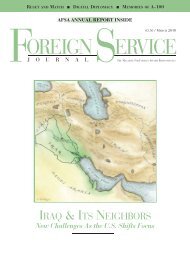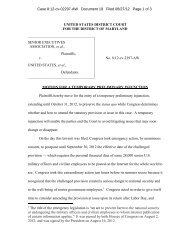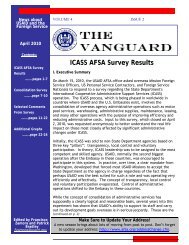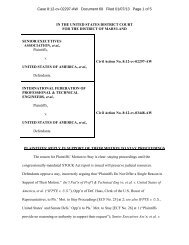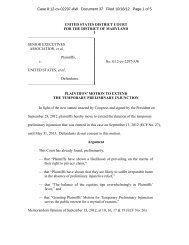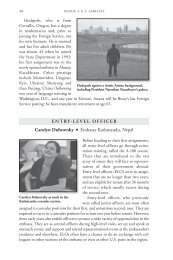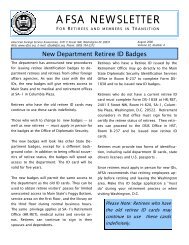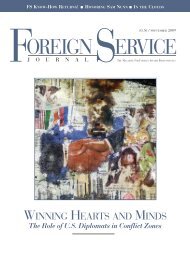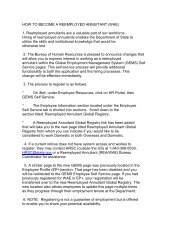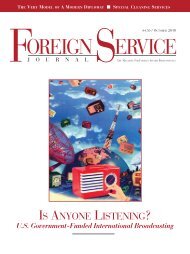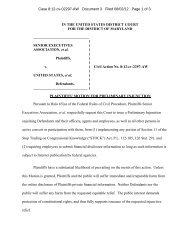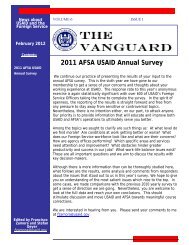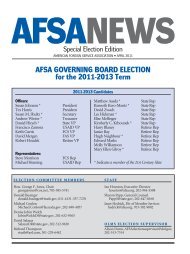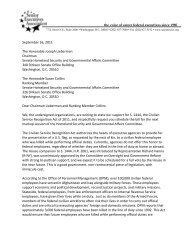F OCUS - American Foreign Service Association
F OCUS - American Foreign Service Association
F OCUS - American Foreign Service Association
Create successful ePaper yourself
Turn your PDF publications into a flip-book with our unique Google optimized e-Paper software.
B O O K S<br />
<br />
“special interest pleading.” Farr is<br />
thoughtful and analytic, but sees the<br />
world as essentially reflecting a single<br />
problem. He gives no indication he is<br />
aware that U.S. diplomacy simultaneously<br />
struggles with challenges including<br />
a revanchist Russia, nuclear proliferation,<br />
global warming, global poverty/trade<br />
imbalances, and racial/ethnic<br />
conflicts. Nor, despite Farr’s arguments,<br />
is it obvious that a religious<br />
rather than a “realist” reading of these<br />
problems will generate positive results<br />
for U.S. foreign policy.<br />
David T. Jones is a retired Senior FSO<br />
and a frequent contributor to the Journal.<br />
Among many other assignments,<br />
he was an editor for the first State Department<br />
International Religious Freedom<br />
report.<br />
Workers’ Paradise<br />
Lost<br />
The Forsaken: An <strong>American</strong><br />
Tragedy in Stalin’s Russia<br />
Tim Tzouliadis, Penguin Press, 2008,<br />
$29.95, hardcover, 436 pages.<br />
REVIEWED BY MARKO VELIKONJA<br />
The Forsaken: An <strong>American</strong> Tragedy<br />
in Stalin’s Russia is a beautifully<br />
written and thoroughly researched, but<br />
wrenching, account of the fate of the<br />
thousands of U.S. citizens who emigrated<br />
to the Soviet Union during the<br />
early 1930s, where they were largely<br />
abandoned by their own government.<br />
At first welcomed and in many cases recruited<br />
to work in Soviet mines and factories,<br />
these <strong>American</strong>s and other<br />
Westerners who had emigrated increasingly<br />
began to be viewed with suspicion.<br />
Most were ultimately executed<br />
or sent to the gulags.<br />
Author Tim Tzouliadis focuses on<br />
how the U.S. State Department — and<br />
in particular the second ambassador to<br />
the USSR, Joseph Davies — turned a<br />
blind eye to the Great Terror, failing to<br />
take any meaningful measures to assist<br />
<strong>American</strong> expatriates even after it became<br />
clear how endangered they were.<br />
While the first U.S. ambassador, William<br />
Bullitt, was ultimately disabused of<br />
any illusions about the Stalinist regime,<br />
Davies always attempted to please his<br />
hosts, even going so far as apologizing<br />
after some U.S. diplomats had attempted<br />
to assist a jailed U.S. citizen.<br />
Davies’ approach was apparently<br />
not popular with many of his subordi-<br />
52 F O R E I G N S E R V I C E J O U R N A L / A P R I L 2 0 0 9



